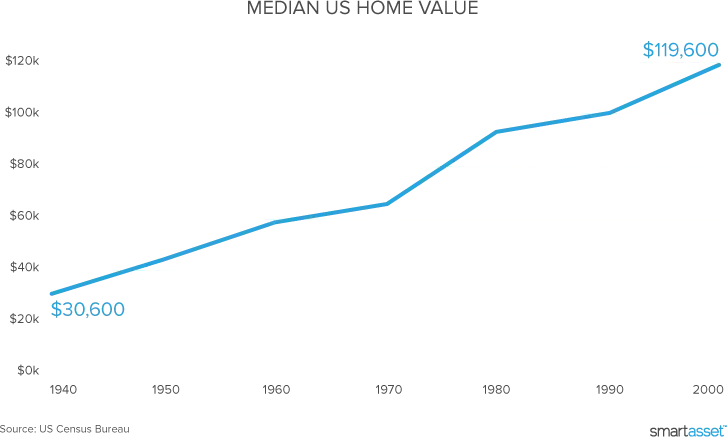
The elation you feel after making a successful offer on a house can quickly give way to self-doubt. Am I overpaying? Could I have gotten the home with a lower offer? We feel your pain.
At SmartAsset, we’re here to help you decide on a home purchase that’s within your budget and makes sense for your financial situation and goals. We recognize that house prices are high and plenty of buyers worry about whether they’re overpaying. Not all homebuyers need to worry about this, though, and not all types of overpaying are equally bad. Read on for some guiding questions that cover the ins and outs of overpaying.
Can you afford what you’re paying for that home?
This is the most important question to ask yourself — and answer honestly. The worst kind of overpaying isn’t paying more than what the house is worth, it’s paying more than you can afford. That’s why we offer tools to help you understand how much house you can afford to buy.
Whether the price you pay for a house is over- or under-market doesn’t matter if your monthly payments are outside of your budget or put too much stress on you and your family. Even if you get a great deal on a place, it may not be the right fit for your bank account.
Bottom line? If your mortgage payments are beyond what you can afford, you’re overpaying.
How competitive is the housing market?
The other kinds of overpaying are paying more than a house is worth in the current market and paying more than the seller would have accepted. “Overpaying” means different things in different real estate markets. For example, a buyer with two kids looking for a three-bedroom brownstone in New York City that’s also in a great school district may need to make an offer above asking price to make sure they beat out other buyers. Meanwhile, a single buyer in Detroit with a lot of flexibility could probably get away with a lower offer than the asking price.
Are you getting the best real estate advice?
In competitive real estate markets agents may encourage buyers to make offers above the listing price of a home. They’ll suggest a dollar amount based on market prices, the price they think the seller wants and the price they think you are willing to offer. There’s guesswork involved and sometimes the offer price that a broker suggests is a little high. That’s because the broker’s priority is facilitating the sale, not necessarily saving you every last penny.
Getting a recommendation for a great broker can save you money and help you be first in line for hot listings. If yours is the first offer, it might not need to be as high. It’s important to work with a broker who is familiar with home values in your target area.
Did you do your market research?
Did you check the sale-to-list ratio for your home and comparable homes in your area? The sale-to-list ratio is what a buyer pays for a house divided by the most recent list price for the house multiplied by 100, expressed as a percentage. If you paid exactly the list price, your sale-to-list ratio is 100%. The tougher your negotiation, the lower the percentage will be.
In real estate bubbles and competitive markets, sale-to-list ratios rarely dip below 90%, and can top 100%. Viewing plenty of houses on the market and doing some research into the median sale-to-list ratio in your target area may help you understand how the purchase you made compares to other local purchases, and relieve any lingering doubts about whether you paid too much based on the value of your home.
If you’re working with a real estate agent, he or she should be able to write up a Comparative Market Analysis (CMA) for you to use in your research. A CMA can also be a good negotiating tool if the seller wants to ask for more money.

Did you protect yourself from a low appraisal?
First you make an offer on the house that gets approved. Then an appraiser looks at the house and comes up with a valuation. What happens if the appraiser’s dollar amount is way below what you and the seller agreed on? Well, if you included an appraisal contingency in the terms of your offer, you’ll be able to renegotiate the price of the home. If you didn’t have an appraisal contingency, you’ll have to rely on the goodwill of the seller to knock the price down — or risk paying a higher amount than the house is worth. There are plenty of sites offering online home appraisals and free home appraisals but until you get the results of an in-person, professional appraisal you won’t know for sure how much a home is worth.
Is your home in an amazing location?
Assuming you take good care of the home, if its location is great you shouldn’t have too much trouble selling it should you decide to move on. Consider location carefully when deciding whether or not to make a high offer on a home. Another factor to consider? Schools. Even if you don’t have kids yourself it’s important to be aware that homes in great school districts will always sell more easily — and for more money — than homes in sub-par school districts. Real estate values often track school quality.
Will you be in your home for a long time?
If you’re planning to stay put for 15 years or more, you don’t need to be as worried about whether you overpaid when you bought it and what your home is worth today. That’s because you’ll have plenty of time to recoup what you spent on closing costs and build equity in the home you’ve purchased. Home values may have gone up (or down) by the time you’re ready to sell.
Did you buy at the end of a real estate boom?
Lots of people bought their homes just before real estate prices plummeted. With hindsight, it’s easy to say that these people “overpaid,” but the truth is that it can be very hard for the average buyer to predict which way the housing market will move. Real estate prices fluctuate and every homebuyer makes decisions based on imperfect information. Even the best home value estimate probably won’t be able to account for future developments (like a recession) that could affect home prices in your area.
Are you pre-approved for a mortgage?
Getting written proof of pre-approval for a mortgage is a good way to avoid overpaying at the time of purchase. Why? Because sellers want to turn their keys over to responsible people who will keep up on their mortgage payments. They may be reluctant to negotiate with someone who isn’t assured of financing for fear that the deal will fall through.
Was your initial offer your best offer?

It was? Oops. Generally it’s best to view your initial offer as only the starting point for negotiations. If you max out your budget with your initial offer, you’ll have no wiggle room when the seller comes back with a counter-offer.
Think of it like haggling at a flea market — you never want the other person to know your absolute maximum price and you want to be able to go through as many rounds of negotiation as it takes to get a deal that you’re comfortable with.
Do you love the home?
If you can afford your housing expenses and you love your home, who cares if you overpaid? Why spend time wondering what your house is worth right now if you’re settled and happy? We know, we know, it’s hard to think that someone else got a better deal and it's easy to dwell on what might have happened if you’d tried a lower offer. Our advice? Don’t stress yourself out by obsessing.
Are you optimizing when you should be satisficing?
Speaking of obsessing, thinking like an optimizer can leave you with more stress over home buying than thinking like a satisficer. What do we mean? Nobel-laureate Herbert Simon coined the term “satisficing” to refer to a decision where one chooses the first adequate option rather than continuing to expend time, energy and resources searching for the absolute best option. The latter approach is known as “optimizing” or “maximizing.”
Are you the kind of person who reads a million online reviews before making a purchase? Do you drive around in circles looking for better and better parking spaces? You may be an optimizer. Optimizing has its advantages but research shows it can also make us unhappy by prompting feelings of regret and anxiety.
We understand that with something as big as a home purchase most people want to make a perfect — or nearly perfect — decision. That’s why we offer so many tools to help you make smart financial decisions.
Once you’re settled in your new home, though, we recommend looking forward to your new life as a homeowner, rather than backward to the homebuying process. Educate yourself, harness the power of SmartAsset’s tools, make an offer that’s within your budget and then relax and enjoy your new place.
